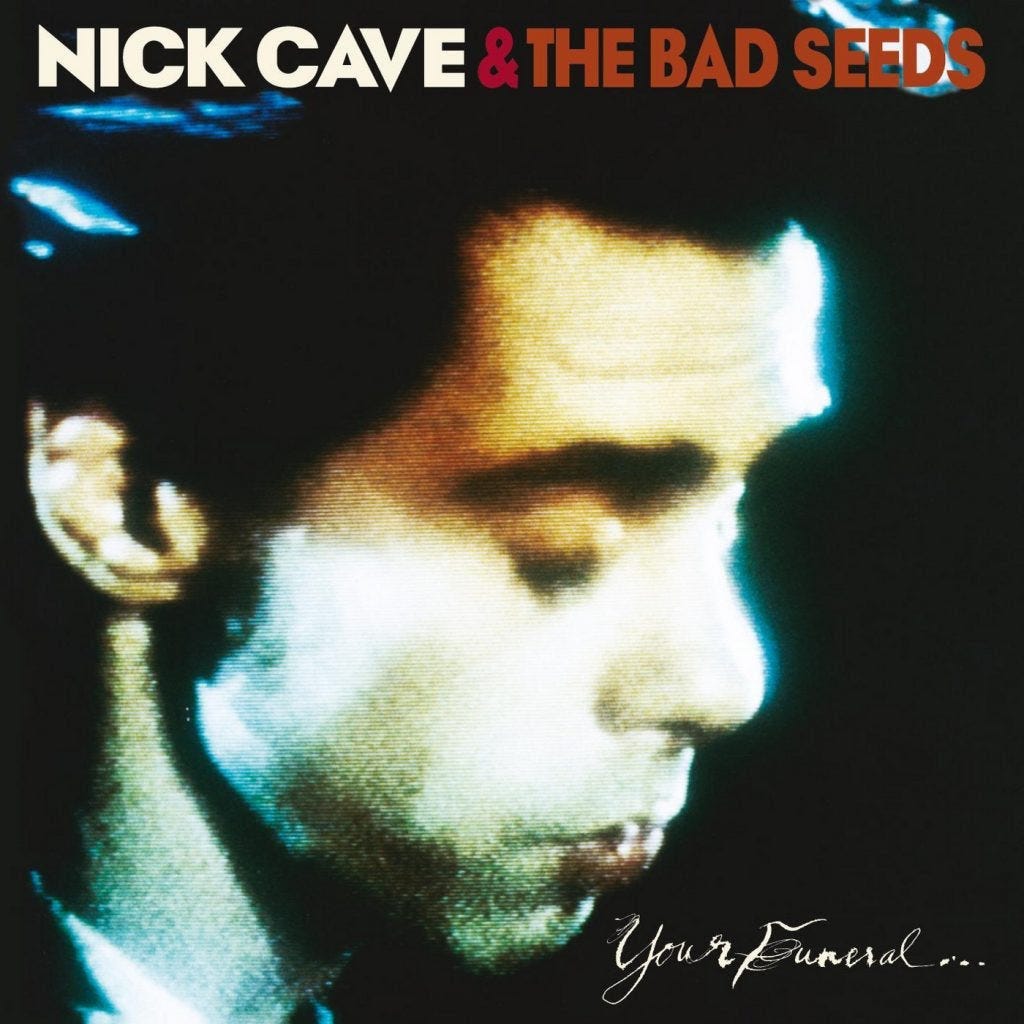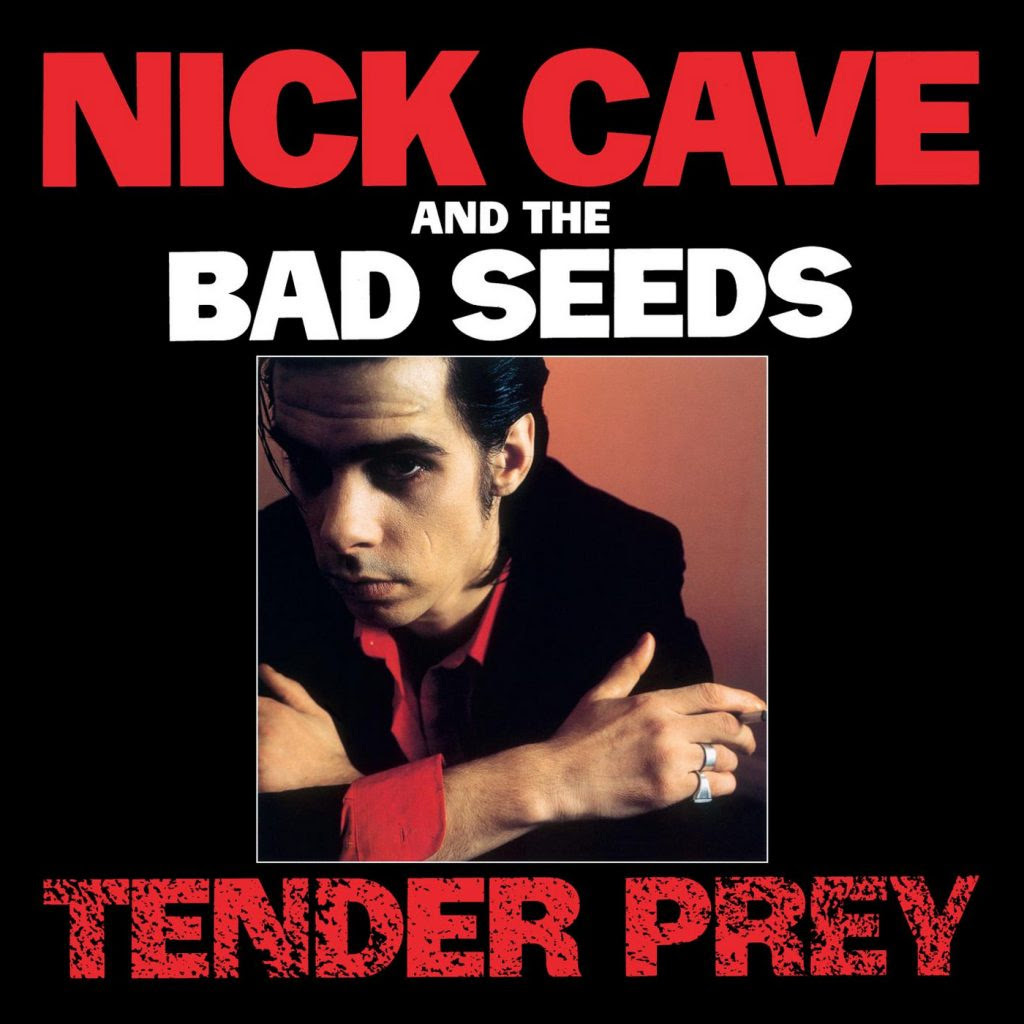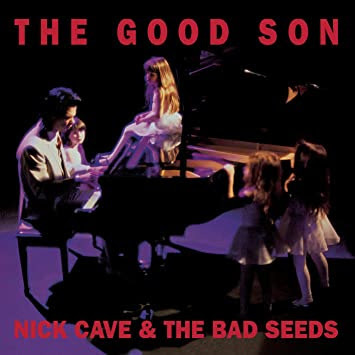A quick welcome back for in The Run Out Grooves hot-seat with the second part of his exploration of Nick Cave’s closers of the 1980s. We will return for the next part in June, which is 90s month here.
‘Long Time Man’ - Your Funeral … My Trial (1986)
“I shot my wife, and brother, I can't even remember the reason why.”
With Thomas Wylder (who joined from Die Haut) now firmly established as a fifth member of The Bad Seeds, sparing Mick Harvey and Barry Adamson their part-time drumming duties, a more coherent band sound was definitely emerging by the time of 1986’s second release Your Funeral … My Trial. Yet there’s a quandary (an opioid elephant in the room) that sits at the heart of this record.
With the band still stationed in Berlin, the recording of ‘YFMT’ coincided with the height (or depth) of Nick Cave’s heroin addiction, and while I have always been highly sceptical of (and often angered by) lazily used claims that drug use can be useful, or even essential, to the artistic process, there can be little doubt the final output here, by whatever means it was achieved, represents another Bad Seed advance.
Cave himself has helped to fuel this dilemma; on the one hand, in a recent Red Hand Files post (#234), he made it clear that the idea art is;
is predicated upon a unique suffering that is somehow linked to drink and drugs is self-serving, self-piteous nonsense (that) shouldn’t be fallen for.
Yet, counterintuitively, he has also said that YFMT is
one of my favourites of the records we've done; it is very special to me; a lot of amazing things happened, musically, in the studio.
Go figure that out! I guess all you can deduce is that what an artist is injecting into their veins, at the time, may prove no more (or indeed no less) important to the work they create than what they ate for breakfast.
And if I’m wrong with that argument, then I guess you would just have to surmise The Bad Seeds must have found themselves a mighty fine Berlin cafe!
The first four tracks are, by some distance, the strongest opening to a Bad Seeds album yet:
‘Sad Waters’ is a great opener, with its time-shifted call and response vocals and momentum build, both of which later became staple Bad Seed tactics.
‘The Carny’ has a strange yet controlled musical structure and an effective spoken vocal, which do together evoke a weird ‘Carny’ (as filmed by David Lynch!)
The title track evidences that Cave did learn lyrically, from the simpler pop songs covered on KAtPs, that sometimes less really can be more effective, and
A disorientating ‘Stranger Than Kindness’ (a song title borrowed for the recent Nick Cave exhibition) unusually has neither words nor music by the man himself, which somehow seems to free him up to give his most confident vocal to date.
While the next three tracks undoubtedly relapse into the more unstructured rambling of old, preventing any consideration of ‘YFMT’ as the first Bad Seeds classic, this just highlights a second straight entry into our ‘closing tracks’ winners enclosure.
‘Long Term Man’ is yet another cover1, although this time twice removed, with The Bad Seeds putting their own interpretation on a 1967 Tim Rose song which, in turn, is a version of a 1920s ‘traditional’ ballad. The song is an early incarnation of the long-running (Cash-like) obsession Cave seems to have with murderers or, more precisely, with trying to get underneath the skin of their motivations.
The real triumph here, though, is that the Bad Seeds version still has all the cacophony of their earlier output yet somehow ends up much more listenable. It is the sound of a band starting to understand how they might be able to harness and control the raucous (and potentially use it to build a long career!)
‘New Morning’ - Tender Prey (1988)
“A new sun was rising.”
‘The Mercy Seat’ casts a long shadow.
Tender Prey’s opening track, arguably still Cave’s best-known song today, is a breakthrough moment in his ‘storytelling’ lyrical development. Its death-row protagonist continues to protest his innocence, with increasing desperation, as the electric chair does its work, until finally, as his “head is melting,” admitting, “I told a lie.”
‘The Mercy Seat’ has become a Bad Seeds legend; played over eight hundred times live (counting solo tours), employed effectively in numerous soundtracks (particularly Peaky Blinders), and reverentially covered by many other artists, including (in a proud moment for Cave) a masterful interpretation by one of his musical heroes, Johnny Cash, as part of his American Recordings renaissance (video below). Unsurprisingly, this song towers above the remainder of ‘Tender Prey’.
Yet even this masterpiece suffers from Tender Prey’s production, with large chunks of the album sounding as if they were recorded six feet underwater. Having cranked out their first four studio albums in two years, and the Bad Seeds then took as long again on the next, yet somehow the record still ends up sounding rushed.
The revolving door of band membership had once again been active, with Barry Adamson departing, replaced by Kid Congo Powers (Gun Club/Cramps) on guitar and (Bargeld collaborator) Roland Wolf on keyboards, but everybody involved seems to acknowledge that both the recording sessions (in Berlin and London) and the resulting album turned into a sprawling mess.
Even Cave, after his enthusiasm for Your Funeral … has little good to say about its follow-up, calling Tender Prey,
a nightmare [made at a time when his life was], spiralling out of control,
with the final output,
reflective of a group, particularly myself, writing songs [with] no larger idea behind it.
Who needs music critics when the album’s maker himself observes;
I hear bad production and bad performances as well!
Reassessing this album now, though, with the retrospective knowledge of Bad Seed delights to come, it becomes easier to be a little more positive than that. Yes, the album is unstructured, and the production certainly does it no favours, but there is still life here (after the electric chair!) with a few pearls shining out of the gloom.
‘Deanna’ (loosely based on ‘Oh Happy Day’) is the nearest thing yet to a Bad Seeds pop song with catchy choruses, and would go on to become another live favourite,
‘Watching Alice’ is an early Cave experiment in trying to develop a more ballad-driven song structure (at least musically if not lyrically), and
‘The City of Refuge’, with its ensemble singalongs, manages to sound like a band having fun, even if they weren’t!
Things undoubtedly go downhill after that, but luckily (from a Run Out Grooves perspective), the album does at least finish off by presenting some genuine hope for the future with ‘New Morning’.
I would argue this pretty song is the first (almost) successful Bad Seeds ballad, and with better production values and more confident ‘soft voice’ vocals, it could sit comfortably on ‘The Boatman’s Call’. A harbinger of a Cave as yet unexplored.
Overall though, Tender Prey could be nobody’s definition of a success. Having speculated earlier if Mute might be losing patience with the band, their fifth outing certainly didn’t help. Daniel Miller joined the dissenting voices with,
the making of that record was a real f***ing mess
but chose to stick with The Bad Seeds, trusting his agent in the camp, by adding;
I always had total faith in Mick Harvey … to keep things going.
The ‘alternative’ energy powerhouse Nick Cave & The Bad Seeds have today become was still a long way off at this point, but under Harvey’s organisation and stewardship, and with a little less turbulence, Miller continued to believe the rare pearls to be found within Tender Prey could yet beget more precious stones.
‘Lucy’ - The Good Son (1990)
“It was the end of love, of misery and woe.”
Five albums in, I was starting to get worried.
Having chosen to title the opening parts of my Bad Seeds retrospective ‘germination’, very little lasting value had sprouted. But then (just in the Nick of time!) along came The Good Son, the band’s first great album.
I could even make a case for this being the first ‘true’ Bad Seeds album, a recognisable pivot point between the part Birthday Party infected variants that preceded it and the distinctive Bad Seed sound that would develop from here on. A palpable belief and confidence underlying The Good Son is perceptibly absent from its predecessors.
So what made the difference?
Firstly, as the proverb runs, a change really can be as good as a rest. There is little doubt that Berlin (the band’s regular base for the previous four albums), and all that occurred there, contributed to Nick’s “spiralling out of control.” In the two years since the mess of Tender Prey, Cave had undertaken a needed spell of rehab, relocated to Sao Paulo, and fallen in love with Brazilian journalist Viviane Carneiro. As he puts it, The Good Son became
some kind of reflection of the way I felt early on in Brazil. I was quite happy there. I was in love, and the first year or two was good.
And secondly (whether Mute manipulated or not), there is a stronger ‘guiding hand’ imprinted all over this album. Nominally, from the credits, Mick Harvey is simply responsible (beyond his bass playing) for co-arranging the new string sections, but it is evident the whole record has a structure and flow previously missing. As the band name suggests, Nick Cave will always, rightly, be The Bad Seeds’ heart and soul, but he has an inner chaos that needs reining in before his genius can shine, and Harvey (followed by Warren Ellis) have, from this album forwards, fulfilled that role.
For the first time, we end up with a Bad Seeds album full of songs that ‘work’.
From the Brazilian chorused opening track ‘Foi Na Cruz’, right through to the simplicity of ‘Lucy’, which we will (appropriately) come to at the end, the slapdash schizophrenia of old has been replaced by an unfaltering, uplifting mood of unity. The religious references that intriguingly underline so much of Cave’s best lyricism remain in place, but so many of the ‘working titles’ (‘The Weeping Song’, ‘The Witness Song’ etc.) making the final cut are a sign these were no longer being overthought.
‘The Ship Song’ is an undoubted highlight (as the John Hillcoat video below confirms); quite possibly (still) the most beautiful song Cave has ever crafted, rightly deserving of its place on so many people’s lists of ‘best ever love songs’. But it’s the consistency of songwriting, the development of an ‘identity’, and the improved vocal performance, right across this record, that together make The Good Son such a leap forward.
Prior to this album, Nick seemed happiest, vocally, when falling back on a shoutier (angrier!) delivery, but here he begins to embrace his inner torch singer. He may never possess a voice to draw Frank Sinatra comparisons, but now (for the first time) we discover Cave prepared to experiment with all the different shades of his voice to match each song’s required mood and an expressive, resonant vocal style starts to emerge.
This brings us to this record’s ‘RoGs’ track ‘Lucy’. While no one is ever likely to claim this is the best song on the album, it is another confident, uncomplicated love song told with a new sense of purity (simply fashioned from piano and strings).
A straight comparison between ‘Lucy’ and Tender Prey’s similarly intended (but more poorly executed) closer ‘New Morning’ is all the ‘chalk and cheese’ evidence required that a fundamental, irreversible shift had taken place in The Bad Seeds firmament.
As we will move on to explore in ‘Bad Seeds Act 2 - Growth’ (taking us from Henry’s Dream through to Nocturama) next month.
… Act 1 was just a start (albeit one that had taken a trouble laden six years, and six albums, to finally arrive), leaving so much more yet to look forward to!
PS I have reviewed the album here using the original track listing from its vinyl release. The running order gets all mixed up on my CD copy and becomes nowhere near as effective. I feel a visit to Discogs may be required (£45 apparently)!








